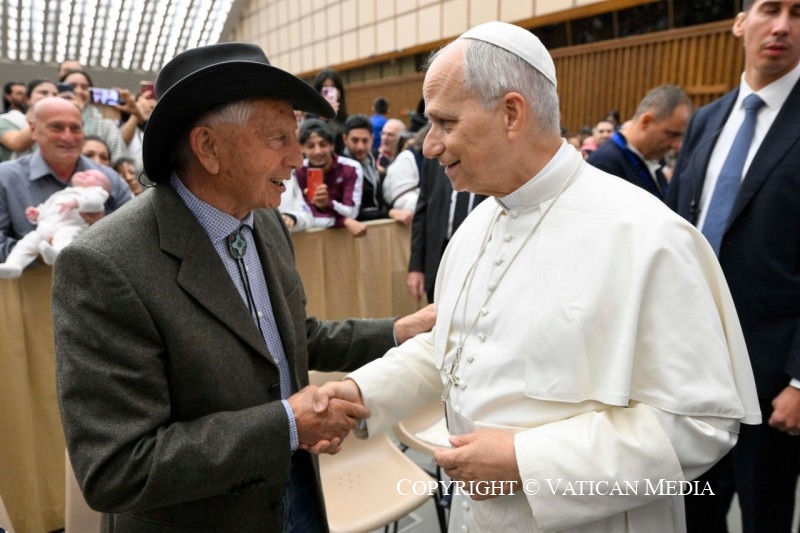Leo XIV to Roma, Sinti and Caminanti: “Remind humanity of the paradigm of Christian life”
Prevsot celebrated the Jubilee of the Gypsy communities, commemorating the 60th anniversary of the first meeting with St Paul VI. He praised the “exemplary faith in works and words” of the Roma, Sinti and Caminanti. Often marginalised by “advanced” societies. To operators and dioceses: “Adequate pastoral care for integral human growth”.
Vatican City (AsiaNews) - ‘Hope is itinerant.’ This is the title of the jubilee event dedicated to ‘our Roma, Sinti and Caminanti brothers and sisters.’ This morning, Pope Leo XIV met with pilgrims who had come to Rome ‘from all parts of Europe - some even from outside Europe,’ as he said in his speech in the Paul VI Hall at the Vatican.
He immediately highlighted the nomadic tradition that characterises these populations; a perpetual movement accompanied by a ‘strong faith’ and a ‘solid trust that does not yield to the hardships of a life often on the margins of society’, Prevost emphasised.
The Pope's wish for them is for peace ‘in their hearts’, also addressed to the workers - also present at today's event - who ‘tirelessly walk’ alongside them. The audience takes place exactly 60 years after the first meeting between the Catholic Church and the Roma, Sinti and Caminanti communities: that with St Paul VI in Pomezia on 26 September 1965. After 1965, many others followed, ‘in different contexts, a sign of lively dialogue and special pastoral care for you,’ Prevost recalled. ‘God the Father loves and blesses you, and the Church also loves and blesses you,’ he continued.
Traditional music, songs, colours and instruments provide the backdrop to the event, which becomes a celebration. The peoples represented today are ‘living witnesses’ of human lives that gravitate around three ‘centralities’.
The Pope explained: ‘Trusting only in God, not attaching oneself to any worldly goods, showing exemplary faith in works and words.’ He added: ‘For almost a thousand years, you have been pilgrims and nomads in a context that has progressively built models of development that have proved to be unjust and unsustainable in many respects.’ Due to their apparent incompatibility with “advanced” societies, the latter have “promptly discarded” the Roma, Sinti and Camminanti populations throughout history.
This has given rise to widespread marginalisation, placing the populations that are now celebrating their Jubilee “on the margins of cities, on the margins of rights, on the margins of education and culture”. The effect of this has been a wandering ‘without peace and without welcome’.
‘First in seasonal caravans, then in camps on the outskirts of cities, where you sometimes still live without electricity and water,’ denounced the Pope. And the model of society that has ‘discarded’ them, he added, is the same one that has relentlessly created ‘the greatest social injustices on a global level: enormous economic inequalities between individuals and peoples, unprecedented financial crises, environmental disasters, wars.’
‘But we, in our faith in Jesus Christ, know that “the stone that the builders rejected has become the cornerstone”,’ Prevost continued. ‘And so we are increasingly strengthened in the idea that the values that the poor uphold with great dignity and pride are those to which we must all look in order to change course.’
These last words echo the theme of Pope Leo XIV's first apostolic exhortation, Dilexi Te, ‘on love for the poor.’ ‘Your presence on the peripheries of the West is indeed a sign to which we must refer in order to eliminate many structures of sin, for the good and progress of humanity towards a more peaceful and just coexistence, in harmony with God, with creation and with others,’ he added.
Recalling the words of his predecessors, the Augustinian pope referred to the words of Benedict XVI, who emphasised the rejection of possessions. ‘Even today, free yourselves from every temptation to possess, from every unjust attachment to things, in order to remain itinerant in the Spirit, poor in spirit, and therefore blessed,’ he said.
‘Do not be discouraged! Being closer to the condition of Christ, poor and humiliated, you remind humanity of the “paradigm of Christian life”.’ The culture that accompanies the Roma, Sinti and Caminanti peoples brings with it a ‘salvific beauty’. And, recalling the words of Pope Francis, he added: ‘May the dignity of work and the dignity of prayer be your strength to break down the walls of mistrust and fear.’
Finally, the pontiff emphasised a ‘true mission’ that the Gypsy peoples - originally from northern India, then spread throughout Europe and beyond - have within the Church. That is, to be ‘protagonists of the current epochal change, walking together with other people of good will in the places where you find yourselves, going beyond mutual distrust, making known the beauty of your culture, sharing your faith, prayer and the bread that is the fruit of honest labour’.
The final thought is for operators, workers and dioceses. The invitation is to develop ‘adequate pastoral care dedicated to the Roma, Sinti and Camminanti communities, for true integral human growth’.
08/11/2025 14:26







.png)










